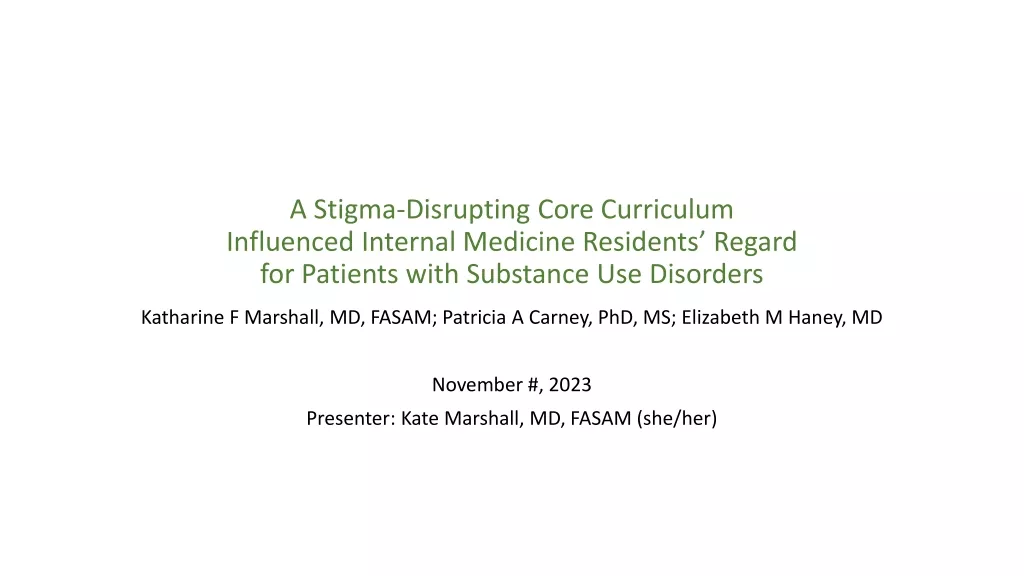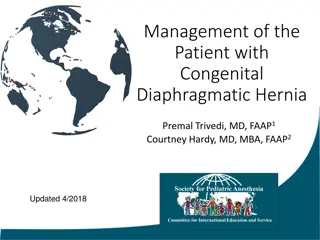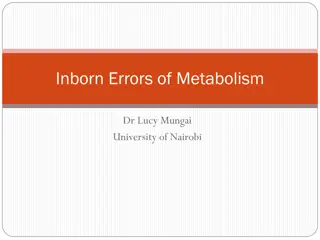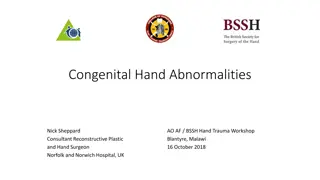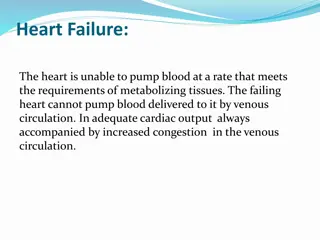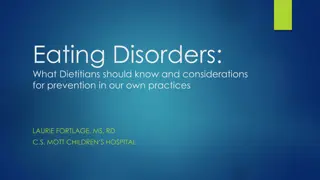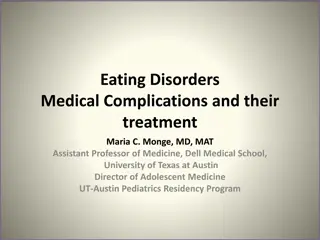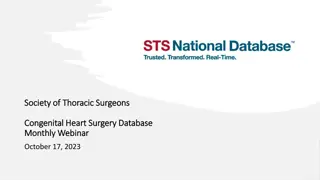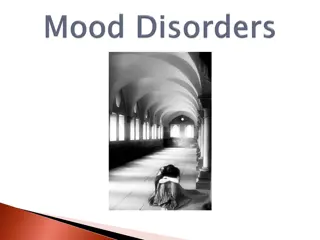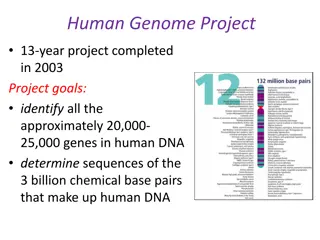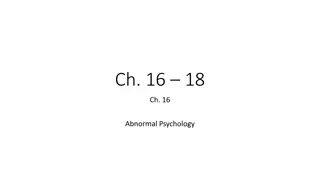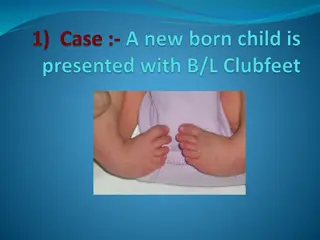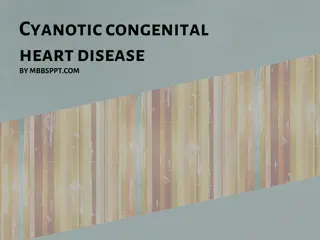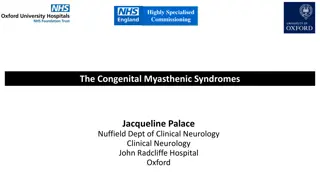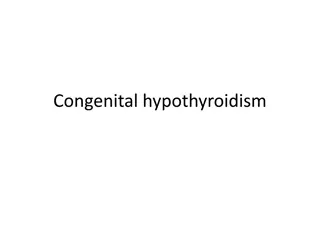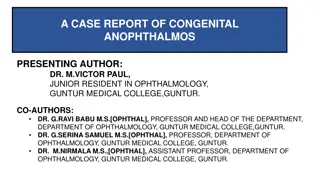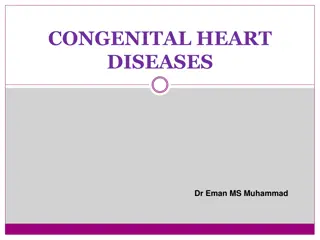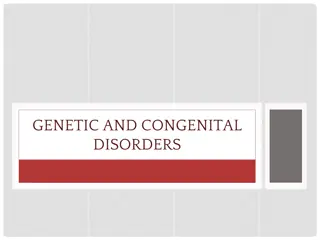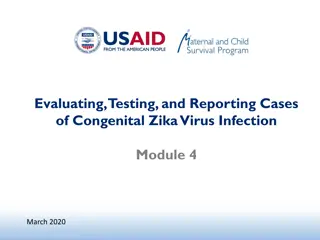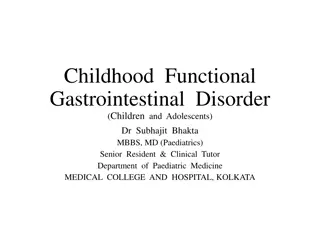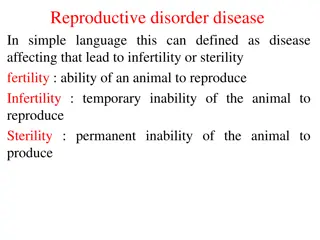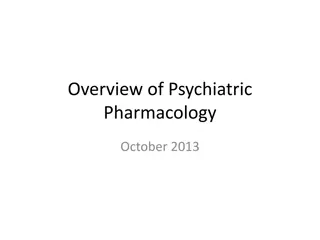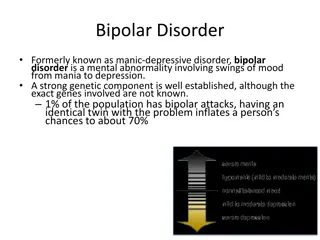Gynecological disorders
Common gynecological disorders including menstrual disorders and abnormal uterine bleeding. Find out about the nursing role in diagnosing and treating these disorders.
3 views • 22 slides
Enhancing Internal Medicine Residents' Approach to Patients with Substance Use Disorders
This study focuses on developing and implementing a stigma-disrupting curriculum to improve internal medicine residents' attitudes and knowledge regarding patients with substance use disorders. By addressing provider stigma and enhancing preparedness, the aim is to promote positive regard and increa
1 views • 27 slides
Exploring Mental Health Categories and Disorders
In today's categories, we delve into themes like stigma, recovery, myths, and facts surrounding mental health. We discuss various disorders including psychotic disorders and observable signs like hallucinations, delusions, and flat affect. Discover the signs and symptoms of mood disorders and high/l
1 views • 71 slides
Overview of Human Genetic Disorders
Human genetic disorders encompass a range of conditions, from recessive disorders like cystic fibrosis to dominant disorders such as Huntington's disease. Examples include cystic fibrosis, Huntington's disease, and sickle-cell anemia. Understanding genetic disorders involves research and awareness o
0 views • 10 slides
Overview of Anxiety and Related Disorders
Anxiety disorders, such as PTSD, panic disorders, phobias, agoraphobia, and OCD, are characterized by varying degrees of fear and distress. Anxiety is a normal response to danger, but when it becomes chronic, it can lead to debilitating conditions. PTSD occurs post-trauma, panic disorders involve in
1 views • 42 slides
Understanding Somatic Symptom Disorders, Conversion Disorders, and Dissociative Disorders
Somatic symptom disorders manifest as physical symptoms without apparent cause, while conversion disorders involve specific physical symptoms incompatible with medical conditions. Illness anxiety disorder involves interpreting normal sensations as disease symptoms. Dissociative disorders lead to a s
1 views • 41 slides
Comprehensive Management of Congenital Diaphragmatic Hernia
This presentation covers the pathophysiology, associated anomalies, diagnosis, consequences, and management of congenital diaphragmatic hernia (CDH). It discusses prenatal interventions, postnatal strategies, anesthetic considerations, and long-term concerns in CDH repair. Understanding the complexi
1 views • 26 slides
Understanding the Impact of Congenital Syphilis in Indiana
Social Vulnerability in Congenital Syphilis cases among mothers in Indiana is a pressing issue. Despite being preventable, the rise in cases signals a failure in detection and care systems. The trend of increasing cases is associated with a rise in infectious syphilis among women. This qualitative a
6 views • 36 slides
Understanding Inborn Errors of Metabolism and Metabolic Disorders
Inborn Errors of Metabolism (IEM) are genetic disorders that disrupt metabolic pathways, leading to substrate accumulation or product deficiency. These disorders can be classified based on toxic accumulation, protein metabolism, carbohydrate intolerance, lysosomal storage issues, energy production d
0 views • 29 slides
Understanding Co-occurring Mental and Physical Health Conditions
Co-occurring mental and physical health disorders are prevalent and require an integrative multidisciplinary approach for effective assessment and treatment. This holistic approach helps address the complexity of managing multiple disorders in an integrated healthcare setting. Through a multi-direct
1 views • 37 slides
Understanding Functional GI Disorders: A Comprehensive Overview
Functional GI disorders encompass a range of conditions affecting the gastrointestinal system, such as irritable bowel syndrome and disorders of the gut-brain interaction. These disorders are characterized by no structural abnormalities but are influenced by factors like motility disturbance, viscer
0 views • 42 slides
Understanding Genetic Disorders and Their Impact on Health
Genetic disorders are caused by abnormalities in genes or chromosomes, leading to various health conditions. Inherited disorders can be passed down from parents to children, affecting physical makeup and processes in the body. In India, there is a high prevalence of genetic disorders, particularly i
1 views • 12 slides
Understanding Choledochal Cysts: A Congenital Anomaly of the Biliary Tract
Choledochal cysts are congenital anomalies of the biliary tract characterized by cystic dilatation at various segments. They can lead to complications like biliary cirrhosis and recurrent pancreatitis. Clinical features include jaundice, abdominal pain, and right epigastric mass. Early detection is
0 views • 22 slides
Understanding Congenital Hand Abnormalities and Associated Syndromes
Explore congenital hand abnormalities such as macrodactyly, trigger thumb, clasped thumb, preaxial deficiency, and syndromes like Holt-Oram Syndrome and Fanconi Anemia. Learn about assessment, intervention plans, and common treatments provided by experts in reconstructive plastic and hand surgery.
1 views • 26 slides
Understanding Heart Failure and Congenital Heart Diseases
Heart failure is a condition where the heart struggles to pump blood efficiently, leading to various complications. It can affect different sides of the heart, with causes ranging from coronary artery disease to valve problems. Congenital heart diseases, on the other hand, are common anomalies prese
0 views • 19 slides
Understanding Eating Disorders: Types, Signs, Effects, and Recovery
Eating disorders are mental disorders characterized by unhealthy eating habits and can have severe physical and psychological consequences. This article explores the definition of eating disorders, signs to look out for, different types such as Anorexia Nervosa, Bulimia Nervosa, Pica, and Purging Di
0 views • 10 slides
Understanding Eating Disorders: Insights for Dietitians
Eating disorders are complex neurobiological conditions that are not merely about control or weight management. These disorders can affect individuals of all genders, body sizes, and socioeconomic backgrounds. Dietitians play a crucial role in identifying, assessing, and treating eating disorders, a
0 views • 41 slides
Understanding Eating Disorders: Medical Complications and Treatment
This presentation by Dr. Maria C. Monge covers the common eating disorders in teenage patients, potential medical complications, and the role of the medical team in treatment. It includes definitions of disorders like Anorexia Nervosa, Bulimia Nervosa, and Binge Eating Disorder according to DSM-5 cr
0 views • 60 slides
Benefits and Risks of Exercise in Congenital Heart Disease
Exploring the definitions of congenital heart disease and exercise, this content delves into the benefits and risks associated with physical activity for individuals with CHD. It highlights the importance of different types of exercise, from dynamic to static, and explains the distinctions between m
0 views • 33 slides
Understanding Neurodevelopmental Disorders in Childhood and Adolescence
Neurodevelopmental disorders in childhood and adolescence encompass a range of conditions including intellectual disabilities, communication disorders, autism spectrum disorder, and attention deficit/hyperactivity disorder. These disorders impact cognitive development, adaptive functioning, and comm
0 views • 30 slides
Understanding Sleep Disorders: Classification and Diagnosis
Sleep disorders encompass various conditions affecting sleep patterns and quality. They are classified into categories such as insomnia, sleep-related breathing disorders, central disorders of hypersomnolence, circadian rhythm sleep-wake disorders, parasomnias, and sleep-related movement disorders.
0 views • 32 slides
Congenital Heart Surgery Database Training and Updates - October 17, 2023
In the upcoming event on October 17, 2023, the Society of Thoracic Surgeons will host a webinar focusing on the Congenital Heart Surgery Database along with essential updates and education for STS data managers. The session will cover a wide range of topics such as case inclusion requirements, data
0 views • 54 slides
Understanding Grief and Depressive Disorders: A Comparative Analysis
Grief and depressive disorders share similarities but also have distinct differences. Grief is a universal emotional state following loss, while depressive disorders involve prolonged mood disturbances. The stages of grief include denial, anger, bargaining, depression, and acceptance, with intervent
0 views • 79 slides
Understanding Genetic Disorders and the Human Genome Project
The Human Genome Project, completed in 2003, aimed to identify all human genes and DNA sequences. Genetic disorders, like autosomal disorders and Huntington's disease, can result from mutations at different levels, affecting single genes, chromosomes, or multiple genes. Albinism and cystic fibrosis
0 views • 37 slides
Understanding Abnormal Psychology: Disorders, Symptoms, and Treatments
Explore the world of abnormal psychology through the lens of different disorders like depression, anxiety, and phobias. Learn about the definitions of abnormal behavior, DSM-V classifications, and various types of psychological disorders. Delve into the complexities of mental health conditions such
0 views • 39 slides
Club Foot (Congenital Talipes Equinovarus): A Comprehensive Overview
Club foot, also known as Congenital Talipes Equinovarus, is a condition characterized by a tri-planar deformity of the foot. This article covers the aetiology, clinical features, diagnosis, treatment options, and patient management strategies for club foot. It discusses the gene variations, environm
0 views • 26 slides
Causes and features of cyanotic congenital heart disease
This informative content covers the causes and features of cyanotic congenital heart disease, including central cyanosis due to congenital heart diseases like Tetralogy of Fallot, pulmonary atresia, Ebstein anomaly, and more. It also discusses non-cardiac causes of cyanosis related to lung diseases,
0 views • 41 slides
Understanding Birth Defects: An Overview of Congenital Anomalies
Birth defects refer to abnormalities present in babies at birth, regardless of genetic or prenatal causes. They affect 2-3% of babies in the US, making them a leading cause of infant mortality. Structural defects like cleft lip/palate, spina bifida, and club foot can impact a child's health and deve
0 views • 17 slides
Specialised Commissioning for Congenital Myasthenic Syndromes - Overview by Professor Jacqueline Palace
Delve into the highly specialised commissioning of Congenital Myasthenic Syndromes by Professor Jacqueline Palace from the Nuffield Department of Clinical Neurology at John Radcliffe Hospital, Oxford. Explore key messages, learning objectives, and disclosures related to diagnosing, differentiating,
0 views • 4 slides
Overview of Classification of Psychiatric Disorders
Psychiatric disorders are illnesses with various manifestations that impact functioning due to disturbances in biological, social, genetic, and other factors. Two key classification systems, ICD-10 and DSM-5, categorize over 200 types of psychiatric illnesses. The ICD-10 includes categories like org
0 views • 18 slides
Optimal Management Strategies for Congenital Hypothyroidism
Congenital hypothyroidism requires early diagnosis and prompt treatment initiation for optimal outcomes. Factors influencing treatment success include the age of starting treatment, severity of hypothyroidism, starting dose of medication, and ongoing monitoring of thyroid levels. Studies suggest tha
0 views • 11 slides
Case Report of Congenital Anophthalmos in a Newborn
The case report discusses a 5-day-old newborn with congenital anophthalmos, a rare condition characterized by the absence of the eye globe since birth. The patient presented with a deformed right eye and examination revealed a complete absence of ocular tissue in the right eye socket along with norm
0 views • 6 slides
Overview of Congenital Heart Diseases
Congenital heart diseases are abnormalities in the heart's structure present at birth. Factors like viral infections, genetic conditions, and maternal health contribute to these conditions. There are non-cyanotic and cyanotic classifications based on shunting patterns. Examples include atrial septal
0 views • 36 slides
Overview of Genetic and Congenital Disorders and Their Causes
Explore the terminology, causes, characteristics, and results of genetic and congenital disorders, as well as the disorders of single-gene inheritance. Learn about autosomal dominant disorders like Marfan Syndrome and Neurofibromatosis. Discover how single-gene disorders are inherited and their impa
0 views • 24 slides
Understanding Congenital Zika Virus Infection Evaluation and Reporting
This module provides comprehensive information on evaluating, testing, and reporting cases of congenital Zika virus infection. Learners will gain insights into guidelines, case definitions, and the importance of accurate reporting for better surveillance. Access to updated resources and the impact o
0 views • 34 slides
Understanding Childhood Functional Gastrointestinal Disorders
Functional Gastrointestinal Disorders (FGIDs) in children and adolescents are characterized by chronic or recurring symptoms that cannot be fully explained by current structural or biochemical tests. These disorders emphasize the role of normal development in symptom presentation and the lack of evi
0 views • 46 slides
Overview of Cyanotic Congenital Heart Diseases (CCHD)
This content provides detailed information and images on various types of Cyanotic Congenital Heart Diseases (CCHD) including CCHD with low PBF, CCHD with high PBF, TOF equivalents, Eisenmenger syndrome, inter-circulatory mixing, and more. It explores causes of cyanosis, classifications based on phy
0 views • 16 slides
Reproductive disorder disease
Reproductive disorders in animals can lead to infertility or sterility, affecting their ability to reproduce. Causes include congenital, hormonal, nutritional, infectious, and management factors. Congenital or hereditary causes may involve conditions like hermaphroditism, freemartin syndrome, and ov
0 views • 20 slides
Overview of Psychiatric Pharmacology: A Comprehensive Guide from 2013
This presentation delves into the nuances of psychiatric pharmacology, exploring common psychiatric conditions, historical perspectives on medical treatments, categories of psychiatric medications, and principles of treatment. It also touches on mental illness definitions from DSM-IV-TR and DSM-V, a
0 views • 27 slides
Understanding Mental Health Disorders: Bipolar Disorder, Anxiety Disorders, & More
Exploring various mental health disorders such as Bipolar Disorder, Anxiety Disorders, Generalized Anxiety Disorder, Panic Disorder, and Phobic Disorders. Learn about their symptoms, prevalence, and impacts on individuals' lives.
0 views • 41 slides

